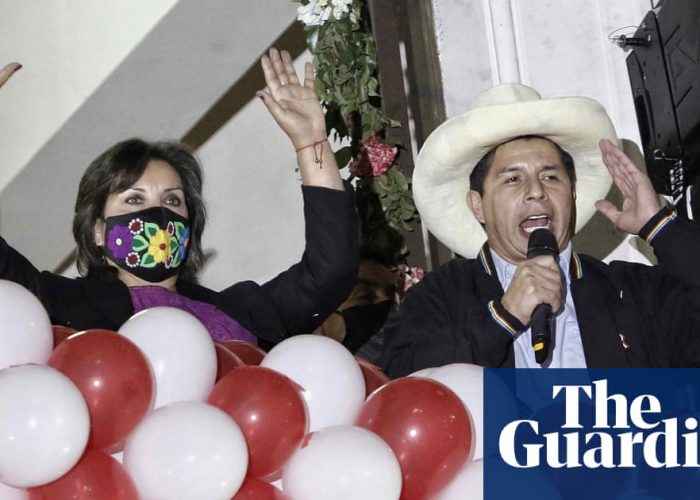After nearly two months of waiting, amid baseless claims of fraud and even rumblings of a military coup, Pedro Castillo will on Wednesday become Perus president. The son of illiterate peasant farmers, Castillos rise to the top on Perus 200th anniversary of independence is hugely symbolic, but he will face huge challenges to unite the country.
Castillos razor-thin win has split the country between those who back his pledge to overhaul politics and the economic system to tackle poverty and inequality, and others who fear his presidency will upturn Perus market-friendly economy and even threaten its democracy.
Receiving his presidential credentials last week, Castillo called for unity, emphatically rejecting claims he would seek to imitate models from other countries. We are not Chavistas, he said. We are not communists, we are not extremists, much less are we terrorists.
But while Castillo, the maverick candidate of Marxist-Leninist party Perú Libre, has moderated his radical message ruling out nationalising mines and calling for the longstanding central bank chief, Julio Velarde, to stay on the outright or tacit refusal of far-right opponents to accept his legitimacy will undermine his ability to govern.
Last week, Castillos opponent, Keiko Fujimori, recognised the electoral tribunals decision declaring him the winner as what the law and the constitution demanded but, in the same breath, added that the truth would come out and pledged to lead the great challenge of stopping communism in Peru.
While fraud claims have been discredited, Castillo beat his far-right opponent by only the narrowest of margins just 44,263 out of 18.8m votes cast or 50.126% of the vote over his rivals 49.874%. Analysts say the slim victory will leave the leftist outsider who has never before held public office with little room to manoeuvre.
The insistence of Fujimori the daughter of the jailed 1990s autocrat Alberto Fujimori on baseless fraud claims has drawn comparisons with former US president Donald Trumps refusal to accept his defeat to Joe Biden in the 2020 election.
But Keiko Fujimori and her supporters are not simply copying the Trump playbook, wrote Jo-Marie Burt, a professor at George Mason University in Virginia and an expert on Perus recent history. Keiko is drawing on and deploying the lessons she learned at the feet of her father, Alberto Fujimori, Perus last dictator. Alberto Fujimoris 10 years in power imploded amid corruption revelations and electoral fraud in 2000. He was later jailed in 2009 for 25 years for corruption and death squad killings.
There is a lot of fear and polarisation, Eduardo Dargent, a political science professor at Limas Pontifical Catholic University, told the Guardian. There is a very strong rightwing movement not as numerous as they think but powerful, and it has been tolerated and sometimes supported by the media.
We are looking at a right[-wing movement] which looks very much like Donald Trumps right, Hungary and Polands right, Brazils Bolsonaros right, he added.
It is the third consecutive and narrow defeat for Fujimori in presidential runoffs. She lost in 2011 and 2016, the latter provoking a revanchist attack on the government, as Fujimori used her partys majority in congress to obstruct legislation, impeach ministers and even force a president from office.
The last five years in Peru has been hell in political terms, said Dargent, predicting a continuation of the constitutional hardball practices and erosion of democratic norms and institutions which has seen the country churn through four presidents and two congresses in five years.
Crucially, Castillo is completely new to Limas corridors of power, not belonging to any of the traditional political, military or business elite channels to the presidency but rather coming to prominence as the leader of a nationwide teachers strike in 2017. His party has 37 out of 130 seats in congress so he will need to seek alliances to survive.
Hes not a Lula or even an Evo Morales who both came with a lot of experience with hardball politics, said Dargent, referring to Luiz Inácio Lula da Silva who swept to power in Brazil in 2002 as an established political figure and trade unionist, and the former Bolivian president of nearly 14 years.
Its a huge challenge for someone who is not used to these kind of political and geopolitical challenges, because this now transcends Peru, he added.
While many Peruvians identify with Castillo, who wears the typical wide-brimmed straw hat of his home region Cajamarca, many also chime with his social conservatism. His views opposing abortion and LGBTQ+ rights differ little from those of his far-right opponents. Absolutely not, he told a journalist when asked whether he would legalise abortion in an interview on national television. When asked the same question about gay marriage, he responded: Even worse. Family first.
Javier Torres, director of the regional news service Noticias Ser, says Castillos election is the result of a political crisis deepened by the pandemic. Peru has the highest Covid-19 death rate per capita and the economic fallout has forced millions back into poverty.
He said expectations from Castillos voters would be high. Lets see what capacity Castillo has to redistribute [wealth] better, he said. But were in a crisis, and that redistribution could generate even more conflict.read more
Peru’s new president to take charge of divided country ravaged by Covid


